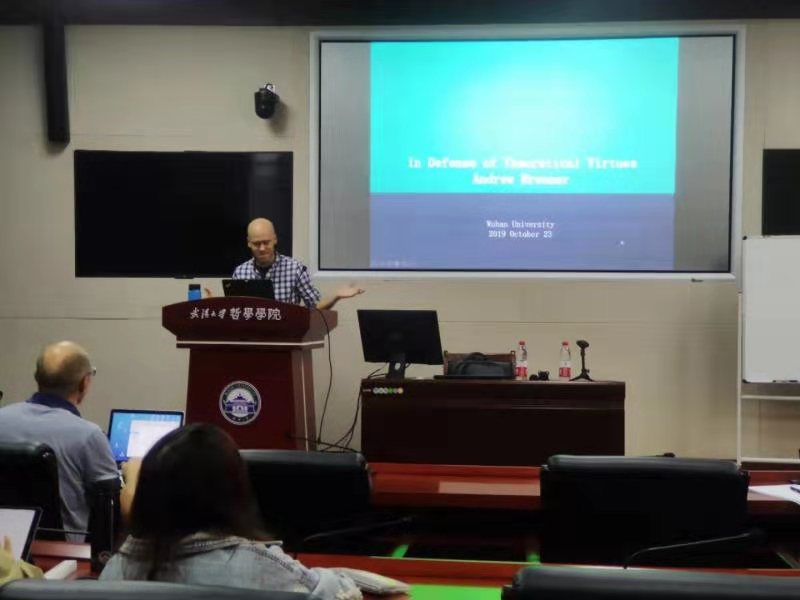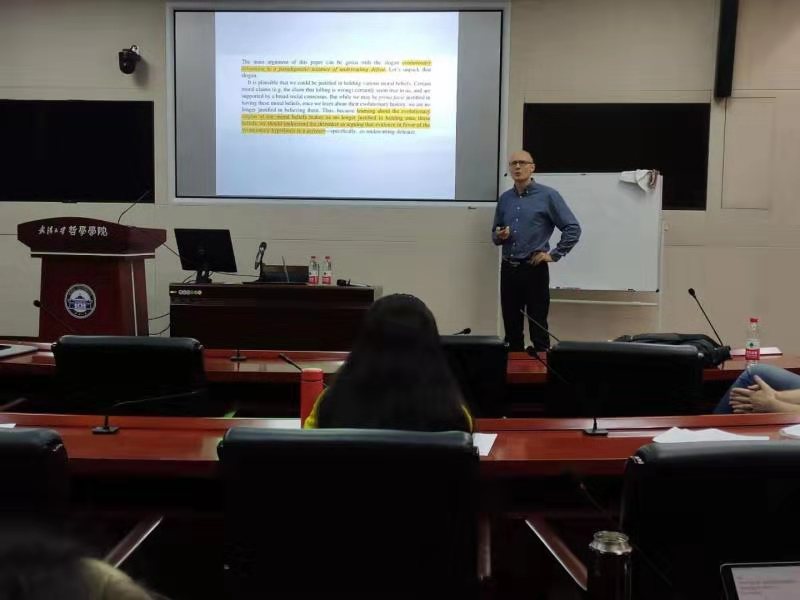Two days from October 23th to 24th have witnessed four profound lectures at Zhenhua Building Room B214, which center on thinking about theory choice: a Wuhan-Leeds workshop in philosophy. The schedule goes as follows:
Session 1: In Defense of Theoretical Virtues by Andrew Brenner


Is it legitimate to appeal to theoretical virtues in metaphysics, especially truth-conducive virtues (e.g. simplicity, accuracy)? Andrew Brenner argues that the undermining argument from Ot´avio Bueno and Scott Shalkowsk is misleading since they rely on a hypothetical-syllogism-based interpretation of theoretical virtues according to which from the fact that some theory exhibits certain theoretical virtues it can be concluded that the theory is true.
From a Bayesian angle, he instead suggests that theoretical virtues are best understood as factors that might enter into the probability of a hypothesis. Thus, the satisfaction of theoretical virtues is alleged to be a mark of truth, in the sense that theories which exhibit theoretical virtues are more likely to be true. Specifically, he treats simplicity as an example of something that confers higher prior probabilities.
In response to two objections (due to limited time) from Bueno and Shalkowsk, he shows how theoretical virtues applied in both science and metaphysics can be defended in a Bayesian way. Simply speaking, he contends that: first, I t is objectionably arbitrary to suppose some theoretical virtues are truth-conducive in science but not in metaphysics(see his other paper); second, both the acceptance and falsification of a theory actually involves theoretical virtues in a case study cited by Bueno and Shalkowski; third, in order to establish that some theory exhibits the theoretical virtues in question we don’t need to first assume that the theory is true, which makes the admission of theoretical virtues at least permissible.
Session 2: Explanation, Simplicity, and Closure by Matt Lutz

Can simplicity as a theoretical virtue, as the Ockham’s Razor teaches, be justified? Successful theories may be credited with adoption of Ockham’s Razor but as they’ve gotten more and more successful, they may also have gotten more and more complex. Matt Lutz claims that both the evolutionary justification and the probabilistic justification for the simplicity principle fail. The evolutionary justification that we prefer simple theories because it requires less energy fails to explain why Ockham’s Razor is truth-conducive. And the probabilistic justification suffers equal-probability between the complex theories and simple ones whether the interpretation of probability is subjective or objective.
To tackle these problems, he offers a novel justification that relies on the epistemic closure principle. Technical terms aside, his main argument may be put as this: if we are not in a position to know that the simple theory is true, then we are not in a position to know that the complex theory is true.And according to the normative preference for knowledge, we ought not to believe whatever we don’t know. Since either the simple or the complex ,if we ought not to believe the complex theory then we ought to believe the simple theory. So the Razor only shows that we should restrict our beliefs to the core elements which simple theories and its rival complex theories held in common, which is to say our preference for simple theories is not of any kind.
Session3: Seek the joints! Avoid the Gruesome! Fidelity as an Epistemic Value by Peter Finocchiaro

How do we understand a belief that it “gets it right”? It is widely interpreted as a matter of truth that the belief of the world corresponds with the world. Peter Finocchiaro enlightens us on another value called fidelity, which dates back to a metaphor “carving each kind along its natural joints while avoiding any splintering indicative of bad butchery” from Phaedrus. Roughly speaking, fidelity is “a form of organizational correspondence” used to evaluate different categorizations of representing the world. For example, the belief that the bracelet is green is more fidelic than the belief that the bracelet is grue in that sense.
When it comes to the epistemic value of fidelity, he refuses to reduce fidelity’s value to truth’s value. If understanding has final value that is not derivative of truth’s, then fidelity has a corresponding, non-basic, final value because in some cases understanding involves fidelity.
But ,If“getting it right”means pursuing both truth and fidelity, then what do we do when the two come into conflict? He contends that“getting it right”is a multi-faceted affair. The pursuit of alethic value requires a balance between the acquisition of true beliefs and the avoidance of false beliefs. The pursuit of fidelic value requires a balance between the acquisition of fidelic beliefs and the avoidance of non-fidelic beliefs. And the pursuit of overall epistemic value requires a balance between the pursuit of alethic value and the pursuit of fidelic value.
Session4: Epistemological problems of Mathematical Platonism: Explanation and Overall Evidence by Juha Saatsi

Can the sui generis features of the objects of mathematical knowledge underwrite an epistemological reason against mathematical Platonism? Juha Saatsi points out that the existing ways of framing the Benacerraf challenge against mathematical Platonism are problematic. Focusing on the acausal or non-spaciotemporal nature of mathematical abstract may presuppose a problematic causal theory of knowledge, and owing mathematical knowledge to unaccountable reliability of the belief-forming mechanisms undermines mathematical necessary truths.
Then how exactly should we frame the challenge? According to Juha, mathematical Platonism is construed as scientific realism about mathematics in the context of philosophy that is naturalistic both in ontology and epistemology. In the light of the overall naturalistically admissible evidence for whatever unobservable aspects of the world our best scientific theories purportedly represent, mathematical Platonism makes it hard to see an explanatory connection that relates the objects of mathematical knowledge to our knowledge-grounding belief states about those objects, which underwrites a naturalistically respectable account of said knowledge.
(Photo&Written by Shen Kangyan)



